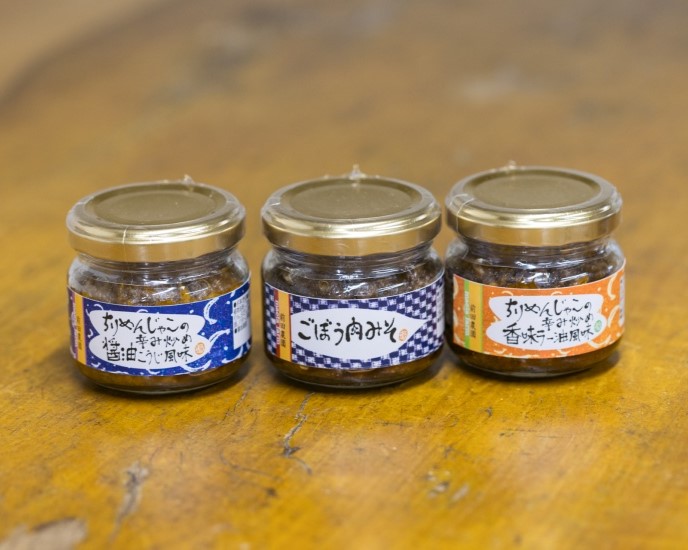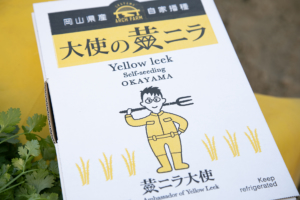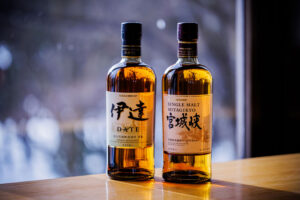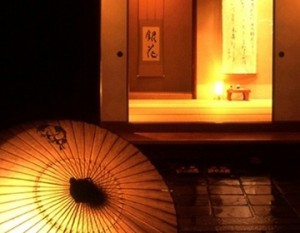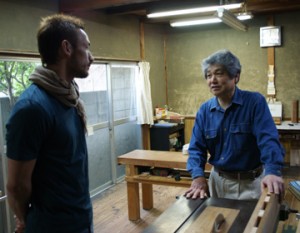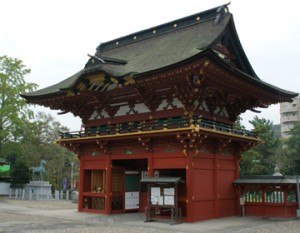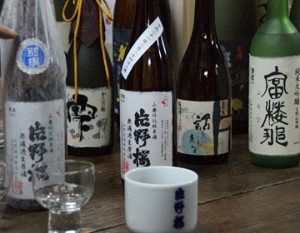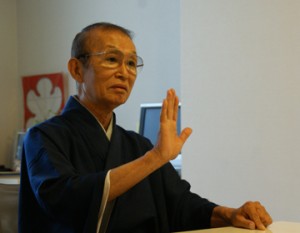Hokuei-cho is located in the center of Tottori Prefecture. Maeda Noen, a farmer who mainly grows Daiei watermelons, has been attracting attention for its handmade and additive-free seasonings and rice dishes. We will look into the reason why they started making processed products in addition to farming, and the secret of creating a deep taste that cannot be imitated elsewhere.
Hojo Sand Dunes, the second largest sand dune in Tottori Prefecture, is located in Hokuei-cho.

Hojo Town, Tohaku County, is located in central Tottori Prefecture. The Sea of Japan is right in front of the town, and the “Hojo Sand Dunes,” the second largest sand dune area after the Tottori Sand Dunes, are spreading out. The fields on the dunes produce rakkyo (Japanese leek), “nebari-kko,” a new variety of yam from Tottori Prefecture, and dune grapes. Also, because of its proximity to Daisen, the largest mountain in the Chugoku region, the area is blessed with nutrient-rich black soil derived from volcanic ash, and is a famous producer of Daiei watermelon, spinach, broccoli, and other vegetables.
Mr. Maeda has been a farmer since his grandparents’ generation in the Daiei watermelon production area.

Mr. Shuji Maeda of Maeda Farm has been farming since his grandparents’ generation in the Daiei area, which has long been famous for Daiei watermelons. He moved to Tokyo when he was a student and worked as a company employee, but was asked by his predecessor to take over the family business when he was 27 years old. He has been growing vegetables as a farmer for many years, mainly Daiei watermelons, growing spinach and mini-tomatoes in greenhouses during the winter, and growing yams in a sandy field.
About 10 years ago, Mr. Maeda started making processed products such as rice snacks and seasonings using home-grown vegetables. Currently, his products are offered on ANA’s international first-class flights and introduced on TV programs as “ordered gourmet” products, and he has been sought after in various industries.
It all started with an encounter with a French chef.

Originally, his wife Junko ran a handmade and additive-free delicatessen in parallel with farming, as she had a constitution that was not compatible with pesticides and other chemicals. About five years after starting the delicatessen, an acquaintance introduced Junko to a cooking school. The instructor of the cooking class was a French chef, Ginjiro Matsushita, who had worked as an executive chef at top hotels in Japan and abroad. Shuji, who wanted to try something other than farming, began attending cooking classes with Junko to learn how to cook from the chef.
One day, he tasted a homemade seasoning that Chef Matsushita had taught him and was impressed by its taste. Maeda, who wanted his vegetables to taste better, and the chef, who wanted to support farmers with his own recipes, hit it off and began developing their own products by taking over the recipes.
We continue to protect the quality of both the ingredients and the cooking.

Although Junko ran a delicatessen, neither Shuji nor any of his employees were amateurs at cooking. In an effort to achieve quality products, Mr. and Mrs. Maeda continued to attend cooking classes, and Chef Matsushita would show up at the Maeda farm once a week to coach them.
In order to reproduce a recipe, even the way vegetables are cut must be exactly the same, millimeter by millimeter and gram by gram. A thermometer is used to measure the temperature to ensure that the taste does not change each time the dish is made. It took him three years to be able to reproduce the chef’s complex recipe exactly as he had devised it.
Chef Matsushita’s recipes are complex, incorporating Western flavors into Japanese cuisine. Some use butter and milk to make them more accessible to foreign diners, and they are made to taste great with both sake and wine.
It is this precise balance and the particular vegetables that only a farmer can produce that make Maeda Farm’s unique delicacies possible. They never omit any manufacturing process, and they do not cut corners with the produce they produce. We never cut corners in the production process, and we never skimp on our own produce. That is our commitment,” says Shuji.
No chemical seasonings or additives
Maeda Farm’s products have one thing in common: they do not use any chemical seasonings or additives. The seasonings and salted malt used as ingredients are also handmade by the farmers themselves. They also contact the manufacturers of the ingredients they purchase to ensure that they do not contain any additives.
Junko has always had a dislike of chemical seasonings, so she started making her own handmade seasonings even before she started making processed foods. Therefore, “additive-free” is a matter of course for them. Although their products have a limited shelf life, they can be eaten with peace of mind by everyone from small children to the elderly. That is why they are also appreciated as gifts. The vegetables used as ingredients are home-grown, and those close to the production area are given priority. Maeda and his staff’s desire to “deliver safe and secure ingredients” is reflected in their food.
Seasonings and rice dishes made possible only by farmers

Maeda Noen has 17 kinds of seasonings and rice dishes available for sale at any given time. Since there are more recipes than that, the lineup changes depending on the availability of ingredients and requests.
Maeda Noen’s first product was “Amakouji Hishio-Shio” (sweet koji sauce). It is made from glutinous rice-based koji and flavored with salt and soy sauce. It can be used as a sauce to pour over meat or fish, or as a marinade for meat or fish. It is also used as an ingredient in other products made at Maeda Farm.
The most popular product is “gobo niku miso” (burdock root miso), which is made with plenty of burdocks they grow themselves. The crispy texture of the dune burdocks and the deep flavor of the blend of four different types of miso are well received. Kinako (soybean flour), butter, and oyster sauce are also included, giving a nod to the taste that cannot be achieved by homemade products.
The “Tottori Rakkyo Chinmi XO Sauce” is also packed with Tottori’s unique flavor, and uses dried shiitake mushrooms from Tottori for the broth. It contains home-made brown-sugar-pickled rakkyo, making it a perfect snack or accompaniment to rice.
The chef’s golden ratio is carefully and painstakingly maintained.

In addition to rice dishes, there are many other basic seasonings such as “Tokusen Kurokoshio”, a well-balanced mix of Hakata salt “Fleur de Sel” and black pepper, and “Chili Mix Spice”, which is useful for seasoning meat.
In the “Tokusen Kuroshokoshio,” the peppercorns are crushed, boiled, and then placed in a colander, a process that is repeated many times. This process removes the peppercorns’ characteristic bitterness, leaving only their aroma. In addition, large grains of salt are carefully ground in a mortar and pestle to a suitable size before being combined with the pepper for a more mellow flavor. Because salt and pepper are so simple, we have taken the time and effort to create the perfect balance so that you will never get tired of using them at your table every day.
The seasonings are not likely to fight each other even when mixed together, and they do not lose their balance even when diluted. The golden ratio is maintained because even the smallest quantities are perfectly matched according to the chef’s recipe. The chef’s recipe is wonderful, and Maeda and his team’s dedication to craftsmanship is evident.
Aiming to create products that enrich the daily dining experience

I recommend you to taste the seasonings as well as the rice dishes. I want people to use them at their tables every day, and they will make their food tastier. If you use our seasonings, you can enjoy vegetables. I would be happy if we could become such a presence,” says Shuji.
In order to be recognized by customers, we need to have our own unique charm and world-class quality. Maeda’s experience as a farmer, Chef Matsushita’s recipes, and his friends who work with him have all come together to create a one-of-a-kind product. Shuji says, “I want to continue to do a good job as a team and deliver the true taste. More and more people will be attracted to Maeda Farm’s seasonings.



